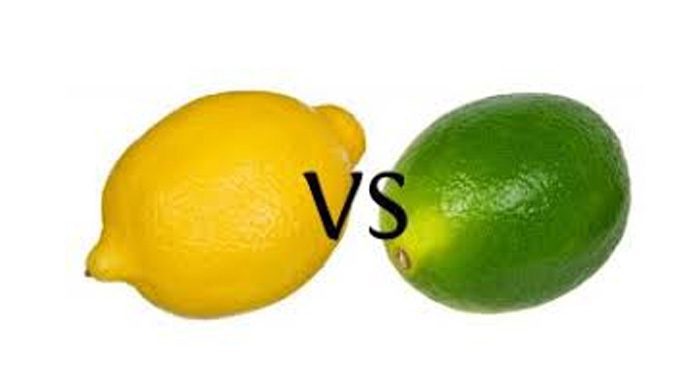Lemon vs Lime – Differences, Benefits, And Effects On Alkalinity

Strictly keeping to the idea that non-hybrid foods are better than hybrid foods, the consumption of lemons or limes would be discouraged because they are both hybrids.[1] The idea is non-hybrid foods have a primal genetic coding that works the best in keeping the body in a state of homeostasis. Even though they are both hybridized fruits they both have health benefits which should be used to support “healthy living,” but is one better than the other?
Hybridization
Hybridization of plants doesn’t necessarily mean the plants and their fruit don’t have any nutritional value, it just mean’s that some of its nutritional value may have been lost. Some hybridization of plants occurs naturally when two plants of the same species cross pollinate, and this is the preferred method of hybridization. Artificial hybridization is a man-made process of crossing two or more plants that are not genetically similar to make another plant whose genetic makeup is markedly different.
The original genetic coding is also watered down when hybridizing three or more plants within the same species to make a wide variety of hybridized plants from a few original plants. Science indicates there are only four original citrus fruits that include: citron (Citrus medica), pommelo (Citrus maxima or Citrus grandis), mandarin (Citrus reticulata) and papeda (Citrus micrantha).Hybridization alters the nutrient makeup, like the vitamins, minerals, proteins, and fats, which is fairly simple to detect. It also alters the phytonutrient makeup which possesses much of the cancer and disease fighting compounds, which science is still trying to understand. The less hybridized plant and fruit are preferred.
Hybridization Of Lemon vs Lime
Genetically, lemon (Citrus limon) is a of hybrid bitter orange (a hybrid of pommelo (Citrus maxima) and mandarine (Citrus reticulata)) and citron (Citrus medica). Lemons are a hybrid of 3 plants.
The original lime Citrus aurantiifolia known as key lime or Mexican lime is a hybrid of citron (Citrus medica) on the paternal side and papeda (Citrus micrantha) on the maternal side.[2][3] Key limes or Mexican limes are a hybrid of 2 plants.
The limes that are common in grocery stores are Persian limes (Citrus latifolia). They are hybrids of key limes Citrus aurantiifolia2 plants, and either citron (Citrus medica)1 plant, or lemon (Citrus limon)2 plants. Persian limes are a hybrid of either 3 or 4 plants.
From the standpoint of the least hybridization key limes would be the better fruit to consume, and then depending of the hybridization of the Persian lime the Persian lime would be equivalent to lemon or would have one more level of hybridization.
Lemon vs Lime Taste
Lemons taste more sour than limes do, and limes have a smoother taste. Which one tastes better depends on what you are making with it. I had preferred to drink lemonade until I started drinking lime water.
Lemonade was refreshing because of sour tart taste that wakes up the taste buds. Lime water is also refreshing but it has a smoother bitter-sweet taste.
I use limes a lot to counterbalance the sweetness of my date smoothies and it does a nice job because it is less sour than lemons and doesn’t overpower the sweetness of the fruits.
Most people can definitely tell the difference in taste between lemons and limes and the video give a demonstration can pick out the more sour taste of the lemons.
Lemon vs Lime Nutrition
The figures are based on 100 grams of raw lemon juice and raw lime juice. The nutrient value of lemons and limes are very similar. Vitamin C is the only nutrient that both lemons and limes supply a large percentage of the daily recommended value.
One thing to keep in mind is even if the nutrient levels (vitamins, minerals, fats, protein) in plant life is low, there are great benefits in their phytonutrients that protect out health. Plants use phytonutrients to protect themselves against fungus, bacteria, and viruses and these phytonutrients offer us the same protection.
| Nutrient | Lemon | Lime |
| % Daily Value | % Daily Value | |
| Calories |
25
1%
|
25
1%
|
| Fat |
0 g
0%
|
0 g
0%
|
| Total Carbohydrate |
8.6 g
3%
|
8.4 g
3%
|
| Vitamin A |
20.0IU
0%
|
50.0IU
1%
|
| Vitamin B6 |
0.1 mg
3%
|
0.0 mg
2%
|
| Vitamin B12 |
0.0 mcg
0%
|
0.0 mcg
0%
|
| Vitamin C |
46.0IU
77%
|
30.0IU
50%
|
| Vitamin E |
0.2 mg
1%
|
0.2 mg
1%
|
| Calcium |
7.0 mg
1%
|
14.0 mg
1%
|
| Iron |
0.0 mg
1%
|
0.1 mg
1%
|
| Potassium |
124 mg
4%
|
117 mg
3%
|
| Iron |
0.0 mg
1%
|
0.1 mg
1%
|
Lemons vs Limes Alkalinity
Outside the body hybrid lemons and limes are highly acidic. Both lemons and lime have a pH around 2. However once lemons and limes are digested by the body they leave behind an alkaline ash that alkalizes the body. The issue is they have to be digested first so they can upset the stomachs of people who have indigestion or acid reflux.
[1] Hybridization
[2] The Origin of Cultivated Citrus
[3] Citrus Fruit Gets Paternity Test
[4] Lemon juice, raw
[5] Lime juice, raw
[6] Lemon pH
[7] How the pH of Lime Juice Changes as it Ages






